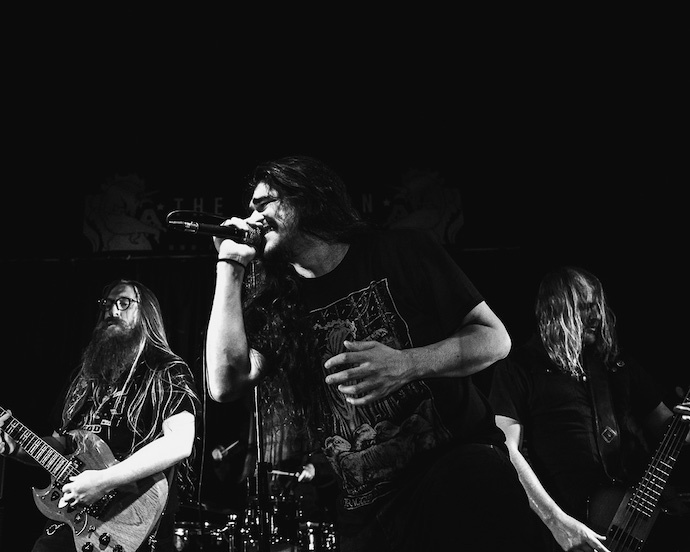
(The UK doom metal band Gévaudan put out a hell of a good album in Umbra last fall, so good that Comrade Aleks felt compelled to reach out for an interview, and the results are his very engaging conversation published below with Gévaudan bassist Andy Salt.)
The “Beast of Gévaudan” was a nickname of a semi-mythical man-eating wolf from French folklore. The creature made about 250 attacks on people in the Gévaudan region from 1764 to 1767, hence its name.
Several heavy bands are named after the beast, and the Hertfordshire doom metal quartet have carried it since 2013. Gévaudan was the first band for Andy Salt (bass) and David Himbury (drums), as Bruce Hamilton (guitar) had already performed in the stoner band Burn the Yeti, and Adam Pirmonhamed (vocals) had previously sung in the progressive thrash formation Manufacture.
First, the EPs Message for the Damned (2014) and Litost (2016) were released, then the group collected enough material for the full-length album Iter (2019), after which the presence of such a promising doom metal unit could no longer be ignored in the underground. So, by the end of 2023, Gévaudan came out with their second big work – Umbra. The album consists of one track with a duration of 43 minutes, and this is not nearly as scary and depressing as it might seem. This deep, emotional doom metal with epic (as well as progressive and psychedelic) touches has its original blend with recognizable traces of some classic acts.
A few of my doom-hooked friends recommended me Umbra, and it’s something each doom-head needs to know. Andy Salt told us a lot about the band’s and album’s backgrounds, so here we go.
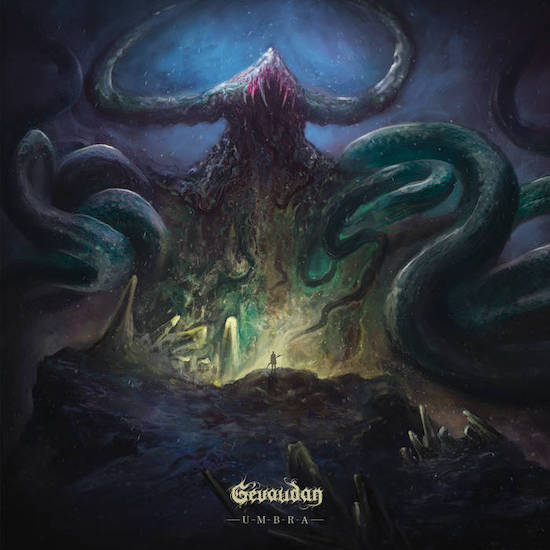
Hi Andy! How are you? What’s going on in the band’s lair?
Hey No Clean Singing! Good thanks – pretty chilled as we’ve hit the end of our year for live performances so taking a bit of time before we start next!
Well, almost unseen, your first decade passed this year, so why not speak about the band’s origin? How did it start for you back in 2013?
Yeah, ten years. Doesn’t feel that long to be honest, but looking back on some of the early pics and footage, it clearly was a long time ago!
Much like our songs, the band built gradually. Bruce and Andy made contact through a “looking for a band” website where doom players were few and far between. We started jamming some Sabbath and some riffs together and there was a bit of chemistry so we stuck at it. Dave entered the fray via an audition and slotted in, which left the gaping hole of wanting a vocalist.
Adam found us via the same platform Bruce and I had used, and Adam sent us a wicked rendition of what became “Lament of the North” from our first EP. When we got together for the first time, it all felt like it just fell into place and we’ve not changed our lineup since that first rehearsal.
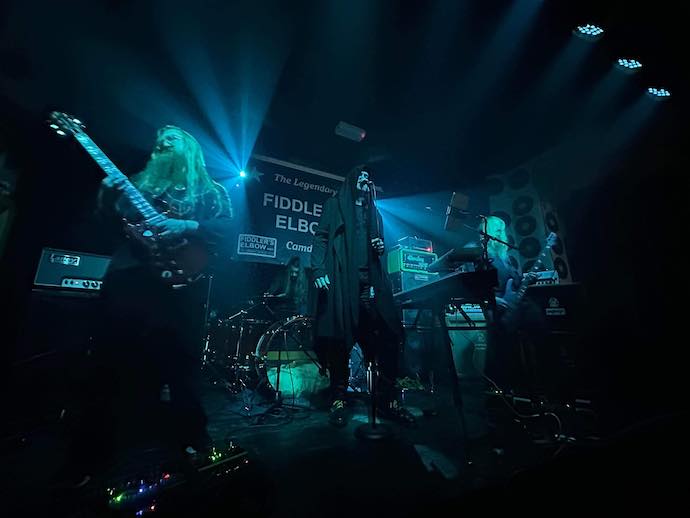
You named the band after the famous Beast of Gévaudan. Why didn’t you choose some of the old creatures that evoked fear in the hearts of Englishmen back in the innocent dark time of the Middle Ages?
We searched…and searched, then looked again for what we felt was the right English lore to put our name against, but nothing we liked seemed to be unused by active bands at that time. We wanted a single word and subsequently looked further afield. The only name that really made the short-list, that we were all behind was Gévaudan – the tale resonated with us all in terms of the direction and thematics we felt we wanted to create through the band, and as it hadn’t at that point been adopted by an active band, we took it on.
Actually, I recalled My Dying Bride’s “The Barghest o’ Whitby” song and the Grimpen Mire band… Well, here comes the blunt question about your influences. What kind of bands helped you to shape the vision of Gévaudan? Were Reverend Bizarre and Warning among them?
Good shout on Warning, definitely an influence. Interestingly, Patrick Walker made it along to our launch gig for Umbra with his drummer in London, which was cool. We draw from a lot of styles and listen to a lot from doom to ’70s psych, to black, and post metal but not constrained to these. A few other bands would include the likes of Sabbath, Yob, Pallbearer, My Dying Bride. It’s all about tone and feel though when writing, so influences can go way broader than the more traditional genre references.
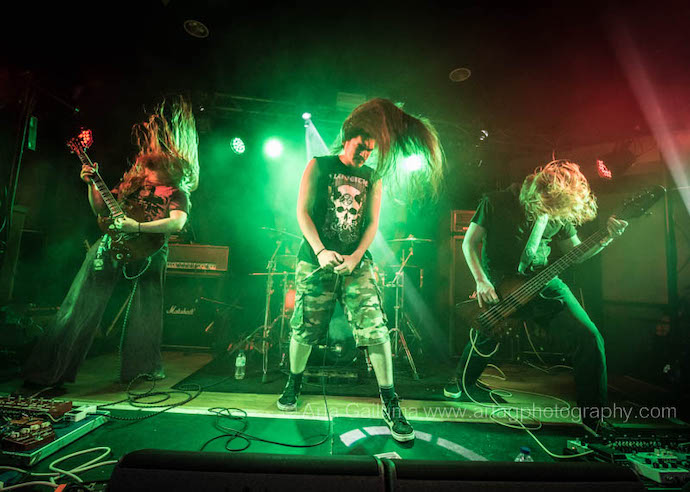
The EPs Message for the Damned and Litost, as well as the first full-length Iter, were released DIY. Was it so difficult to find a label, or was it your initial plan to run the process with your own hands?
We’ve always, and continue to be pretty DIY in our approach. Even when it comes to our latest run of dates, we took on the running and promotion of two of the nights. Initially, it felt right doing the EPs as DIY projects. When we got to Iter, due to what felt like a real step change in our songwriting and dynamics, we elected to step up production considerably by working with Mike Exeter, but not with an aim of attracting a label. We had reached out to a few UK labels at the point of pre-production, and after the album was ready, but we’ve always just wanted to create music and put it out when we’ve been happy with it. We didn’t hear anything back, so we just cracked on with our Plan A.
Yes, I don’t like that situation. I keep on asking relatively new bands how they see their prospects, because labels are ready to release literally anything from some Old Important Band, ignoring new acts. It doesn’t relate to sales, everyone knows that you won’t be rich playing doom, but it’s the question of coverage… and so on. So how do you see your prospects from this position?
We’ve built a solid following that seems to be growing organically, especially following the release of our second album. New listeners started to dig into Iter and it’s really cool the way our fanbase continues to grow across multiple countries. Interest from doom fans and respect from peers is important to us, and as long as we continue to reach new ears and create music that excites us and comes from the heart, then I think our prospects are good – having a supportive label in Meuse Music Records certainly helps from both a credibility standpoint and covering fans that we wouldn’t necessarily reach.
“Iter” is the “way” in Latin, “litos” means “stone” in Greek, and now your second album is entitled “Umbra” – “shadow”. That makes the albums’ titles more remarkable and mysterious in some way. What was the vision of Gévaudan’s concept from the start? Did you have some image in your mind?
Our central themes are typically based in fantasy, history, and the occult. Based on all wanting to play doom, and linked to the naming of the band, it was always the intention to create in that space.
“Litost” was Czech – “a state of agony and torment created by the sudden sight of one’s own misery”, and “Iter” we took from the Latin “journey,” which was themed around the passing into, through, and out of life and the interactions with gods whilst present.
Through the likes of Sabbath, and Goatsnake, and we’re all on the same page of where we wanted it to go. The feel has always been in the riffs, but when it comes to the thematics and concepts that the lyrics point to, that’s always rested with Adam, but it always starts in a suitably dark area.
The band’s second album Umbra is one huge tragic play of twisted rebirth and spiritual decay or ascension depending on one’s point of view. How did you figure out the idea of such a massive concept with the plot which is open for interpretations?
When working up concepts for this album we wanted to set it in a different place to any of our previous work. Whilst we didn’t want to stray too far from fantasy/occult, we wanted to write something with more of a personal and relatable element. Umbra explores depression through the eyes of eldritch horror, culminating in the unrelenting shadow that’s imparted on its sufferer – a battle of light, stalked by darkness.
Using eldritch horror as the vehicle to express and explore depression, combined with the tonal shifts through the record, open it up to interpretation, as does any piece of music to be honest.
At the time, Adam was managing a bout of depression and kind of fell naturally into writing about how they were feeling; almost an indescribable and ominous feeling, a sense of something looming. From that feeling it was instinctive for them to use themes and ideas from Eldritch Horror as an allegory for depression and distress. It was rewarding to write about a relatable topic whilst still staying true to our known themes and tones.
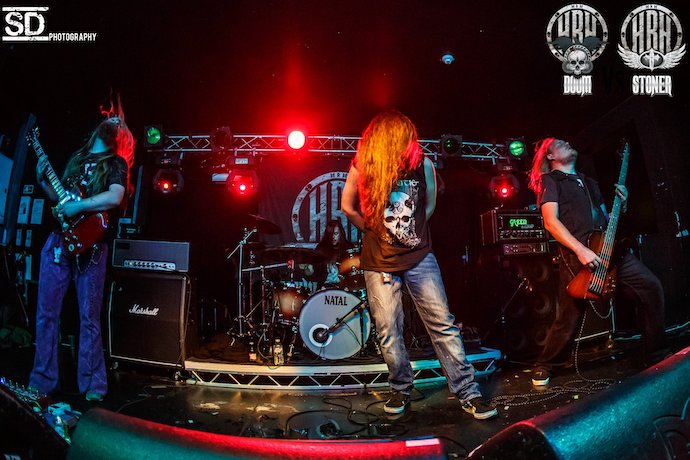
What do you put into the idea of “Eldritch Horror”?
For us Eldritch Horror is about the unknown and the unknowing, a sense of looming dread, and a lingering despair. It’s a representation of cosmic mystery that plays well into the themes of the album.
Despite the fact that Umbra is the only solid track, it could be split into a few separate songs, as its moods and themes are pleasantly diverse, and the composition sounds like a good multilayered track with a lot of undercurrents inside. Why did you unite all these themes in one song?
We’ve had a desire to create a single ‘concept’ piece since we formed in 2013. It was in 2017 when our writing evolved a lot, and the creation of Iter really cemented the tones, emotion, and dynamics we feel best represent what we’re about. With that in place, and the manner in which “Dawntreader” (c.11 mins) and “Duskwalker” (15 mins) work as counterpart pieces, it felt like the right time to embark on this one-track epic composition.
You recorded the album with Mike Exeter as the sound producer again. How is it to work with such an experienced professional? How did he meet your idea to record the album as one piece?
It’s awesome to work with such a talented individual, with such an extensive amount of experience and who has worked with so many artists that have influenced each of us.
Mike knows how to get the best performances out of us, and he knows how to strike the right balance between having a good laugh, and supporting us professionally.
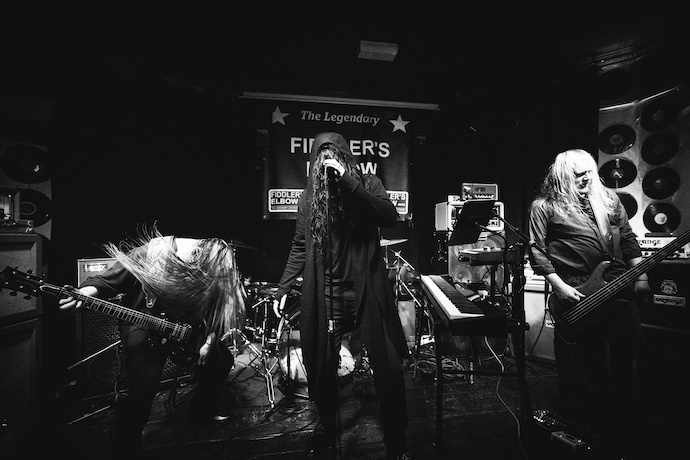
Did you manage to fulfill all of your ideas at the studio? The album’s atmosphere rooted in the nuances of its sound is amazing, and I wonder how you achieved such impressive results.
Yeah, we definitely got what we wanted out of the experience; we consider the album in four complete movements, and recorded it in that way, then stitched it carefully together. Mike is an excellent producer and engineer, so honestly it felt like it came together quite effortlessly – we knew the song well going in, so it was just a case of laying down some takes, and piecing it all together.
In the end of 2023, you played a series of shows performing the album for the first time. How did this mini-tour go?
The tour was a blast; we appreciate we’re a bit of a niche band, and it’s always nice to have people come out and support us and live music in general. We played with a bunch of fantastic bands across the south of England, and ended on a real high in Brighton alongside Crowgod and Sea Bastard.
Sea Bastard? I remember the band… But I see that they haven’t released anything new for years. However, did you meet your expectations from the tour if you had any? What would you change about organizing a tour next time?
We set out to share Umbra in full and it was really well-received night after night, so definitely met our expectations. It’s difficult to say what we’d change – maybe slightly less DIY with a couple more dates to extend it a touch. Adding the whole promotion and running of a night adds that extra level of focus and time, but it was incredibly rewarding to be able to build our own bills, and when you see a busy venue and people grooving to the tunes, that’s an incredibly rewarding feeling.
How difficult is it to play the entire Umbra? Are there any specific moments that make it a challenge?
I think the first time it felt a little unusual to not have those natural breaks in a set, but there’s enough dynamics in the song that we’re not all constantly playing, so we’d probably say it’s not too different to a regular set. Between recording the album and releasing it, we actually had an entire year due to the scheduling of our label, vinyl pressing times, and a bit of life business (including Adam’s wedding!) so by the time we hit the stage we were pretty comfortable playing Umbra through from start to finish.
Thanks for the interview, Andy! It was a pleasure to know a bit more about the band and Umbra, which is a top album among many of my doom-fellows as far as I know. What are your plans for 2024?
Thank you, that’s very kind! 2024 is already shaping up nicely, we’ve got some cool festivals and events to play including Maryland Metal Fest III in London (Feb), Ruination Festival, Bradford (May) and Northants Rocks, Finedon (July) – there’s more to announce of course! We’ve also started writing again and will be working on our next release over the coming 12 months, so stay tuned, keep it low and slow! Thanks very much for chatting.
https://www.facebook.com/Gevaudandoom
http://www.gevaudandoom.co.uk/
https://gevaudan.bandcamp.com/track/umbra
